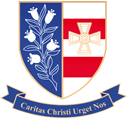What is maths? The Oxford dictionary definition tells us it is ‘the abstract science of number, quantity and space…’ At its heart mathematics is the language used to explain how the world works. Dean Charles Schlicter (Wisconsin University, 1920s) quoted ‘Go down deep enough into anything and you will find mathematics.’

Too often mathematics is viewed as a skills acquisition; can you find the missing angle?; can you factorise a quadratic? Can you find the volume of the sphere? Yes, we need these skills to be successful mathematicians but the ultimate aim is to be able apply the skills and knowledge acquired in order to think logically and solve problems. Maths allows us to develop a disciplined approach to problems.
| Key Documents | ||
| Maths Learning Journey | Further Maths Learning Journey | Curriculum Intent |
Course Content
Both the mathematics and further mathematics courses build upon the mathematics students have studied at GCSE. Students will follow the Edexcel syllabus in both Mathematics and Further Mathematics. Both courses are 2-year linear courses, examined externally at the end of Year 13.
During this course you will learn to extend your knowledge of algebra, geometry and handling data from GCSE and explore the ways in which mathematics can be applied in the real world.
Pure mathematics: Some of the new topics studied are coordinate geometry, series, calculus and numerical methods. These topics have a high algebraic content and they are an excellent introduction to mathematics at undergraduate level. Branching further into pure mathematics, students will study topics such as logarithms & exponentials, radian measure and modelling with vectors.
Mechanics and Statistics: The applied content of the course introduces students to modelling, visualising situations and the mathematical forces that are in action. Using statistics, you can solve more complex problems based around probabilities, testing hypotheses and using a large data set.
The further mathematics course follows Edexcel entry route C. This route covers all content included in the mathematics course, in addition to a wide variety of further pure mathematics and mechanics concepts.
Further mathematics introduces new topics such as matrices and complex numbers – topics which form the basis of all undergraduate studies. Students who select further mathematics usually go on to study the subject at university.
How is the course assessed?
The A level mathematics course is assessed via 3 written examinations taken at the end of the 2-year course. Papers 1 and 2 cover the entire pure mathematics syllabus with Paper 3 examining applied mathematics. Each paper is worth 100 marks and lasts 2 hours.
The further mathematics course is assessed by means of 4 written papers taken at the end of the 2-year course. Each is 1 hour 30 minutes in length and worth 75 marks. Papers 1 and 2 cover the core content of the course with papers 3 and 4 covering further concepts in pure mathematics and mechanics separately.
When preparing for key tasks, mocks and final assessments pupils have access to Integral Maths as well as free online access to Exam Solutions.
Course Overview
These documents give a more detailed insight to the topics studied in each module.
What are the entry requirements?
Mathematics is widely regarded as a challenging A-Level. The course begins with the study of algebraic concepts at grade 7 GCSE level and progresses quickly. For this reason, a Grade 7 at GCSE is advised for Mathematics and a Grade 8/9 for Further Mathematics. This bridging course will support your transition from GCSE to A-level Maths. Please complete before your first lesson in September.
Careers/Higher Education Pathways
Mathematics is essential for studying the subject itself as well as physics or engineering at university, and for these subjects, further mathematics is highly desirable or even essential at the top institutions. Other courses which benefit from mathematics A-Level include medicine, economics, accounting and other sciences.
KS5 Enrichment
New for this academic year, 2022 – 2023, we are offering pupils in Year 12 Level 3 Mathematical Studies, route 2A. This looks at the practical applications of statistics and other elements of maths used in everyday life, such as student loans and tax. This will be assessed at the end of Year 13 with 2 examinations.
Further information can be found here.
To help support pupils in their independent learning they have access to Integral Maths, via a unique login and password.


